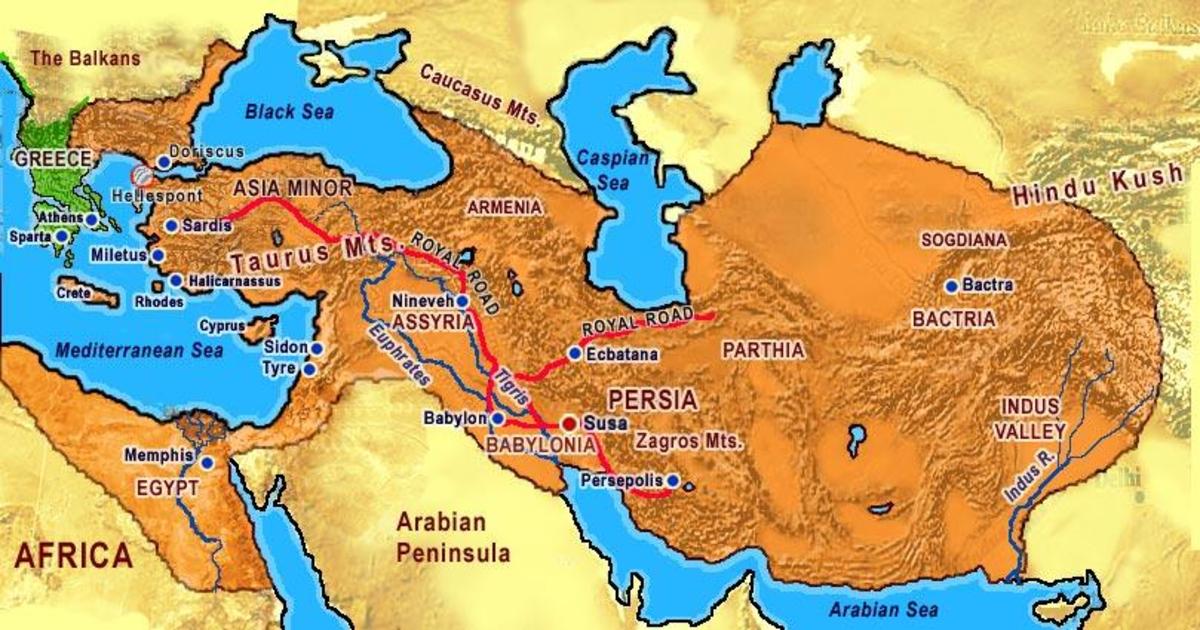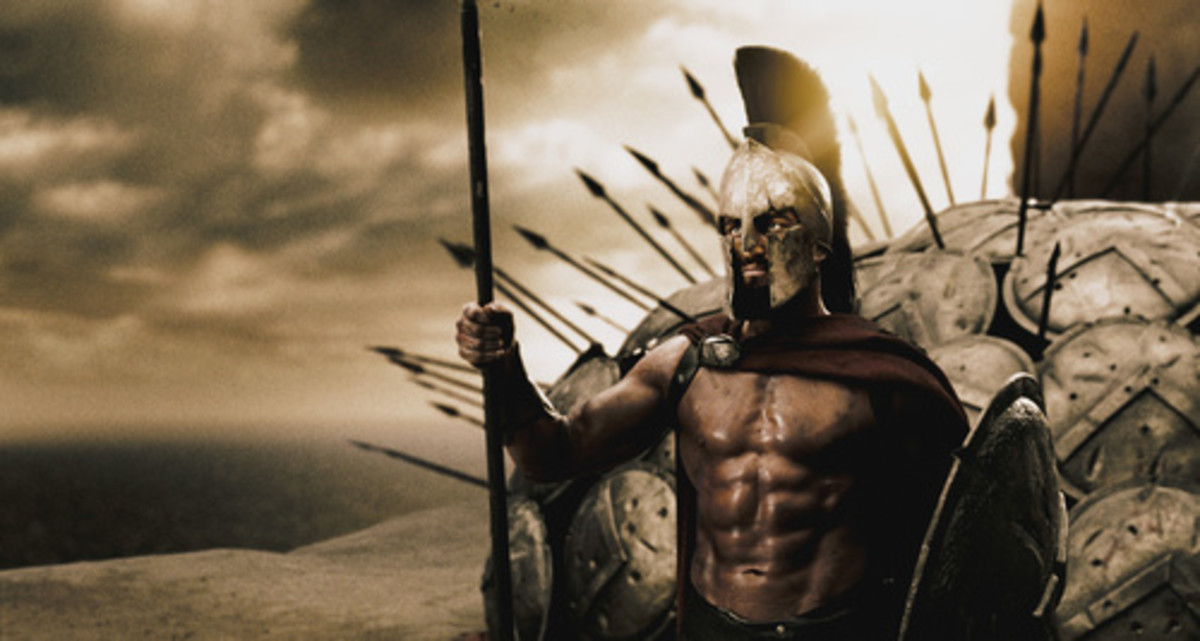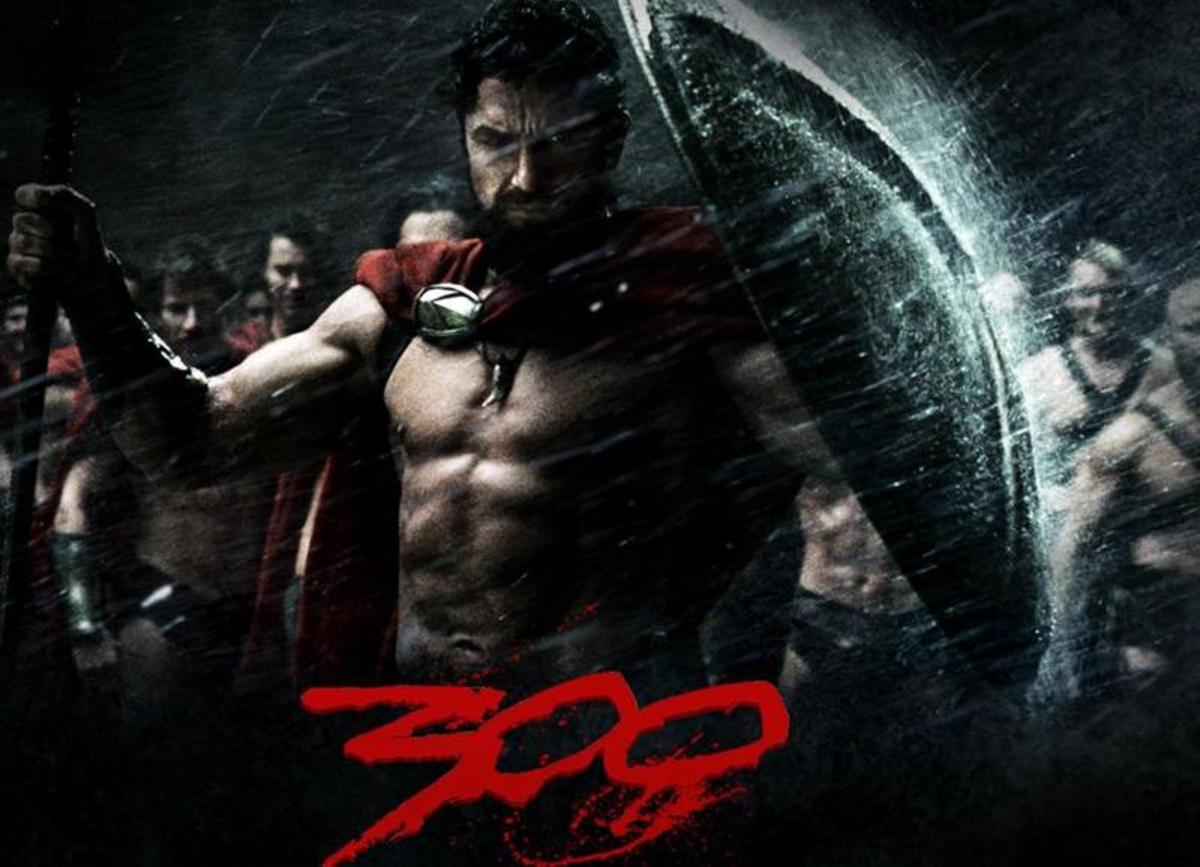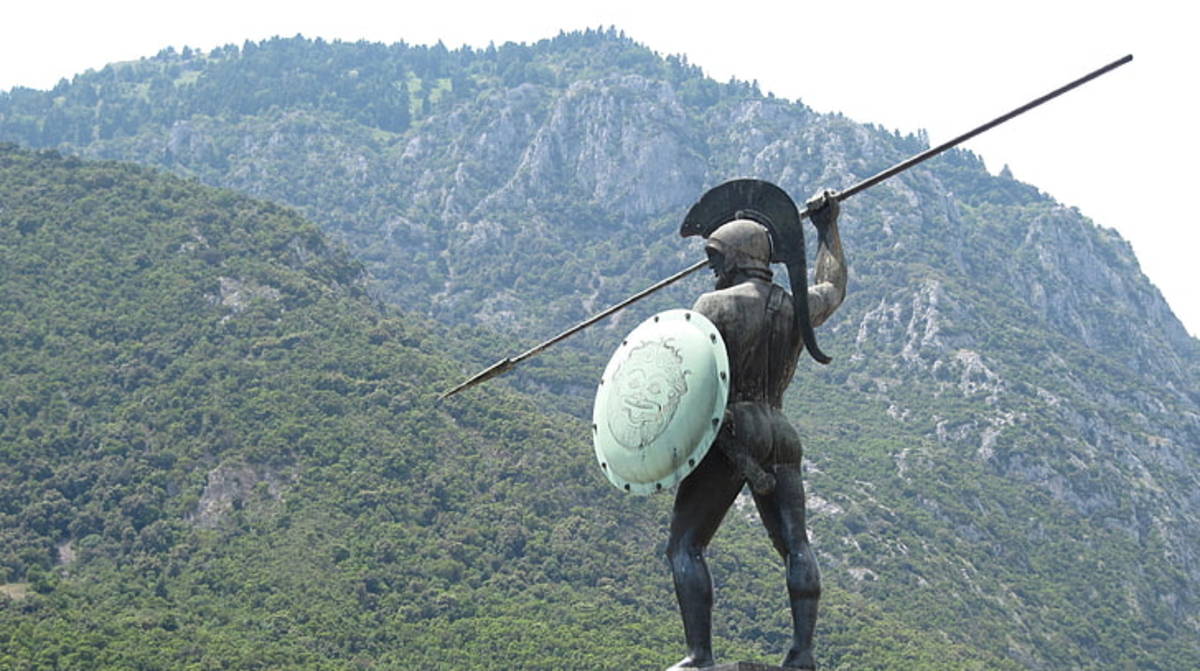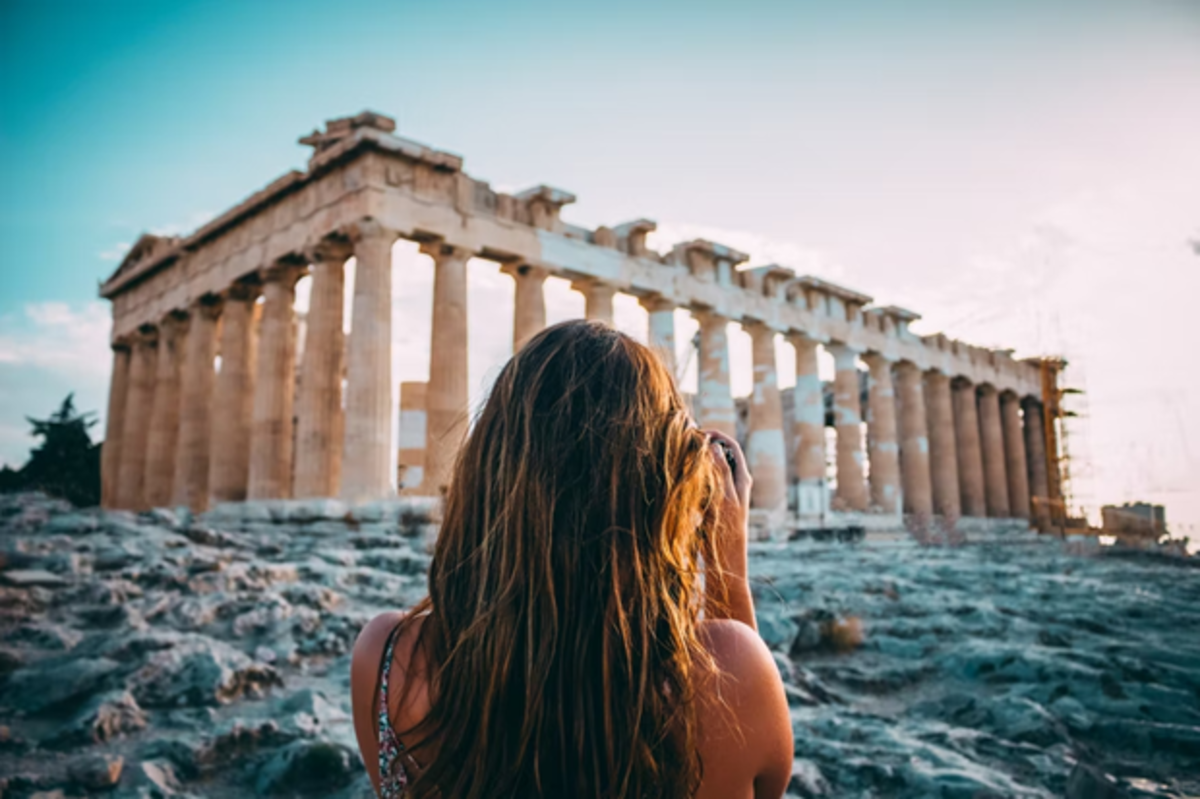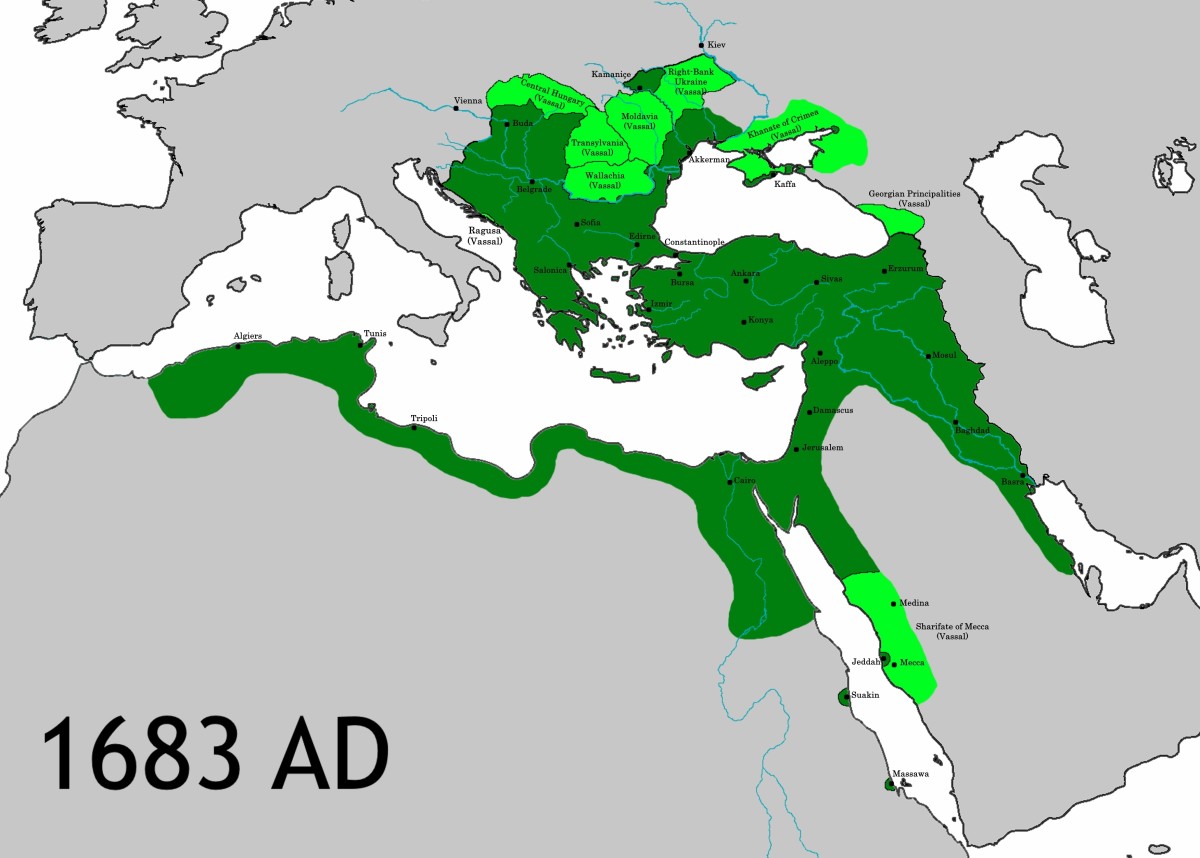Essay Paper: Sparta Civilization
King Leonidas from the movie 300
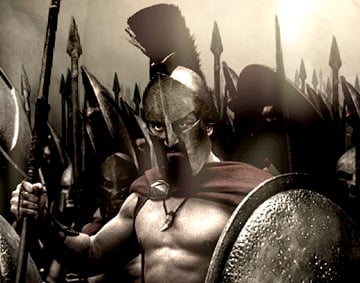
More Essays by ME!
Sparta Civilization
Intro
The Spartans were a legendary civilization. They are remembered today for their culture and war by books, stories, comics, movies and many other medias. The Spartans were known for their bravery and war tactics. They had many memorable battle as well as many famous heroes and kings. On the flip side, they had a rich society with the arts playing a viable role. With women being equal to men and newborns being left for dead so only the strongest can survive. All in all, Sparta was a wonderful culture that deserves to be told about once more. Sparta’s history and cultural ways will echo in eternity.
History
Sparta has an early history that has a mythical and human element about Sparta’s creation. Sparta was the capital of Laconia and it was apart of ancient Greece. There are stories on who founded Sparta. One mythical story is about an ancient Greek god by the name of Lacedaemon, who was a son of the great Zeus. They tell that this god was the founder of ancient Sparta. Another more sensible theory was that ancient Greek settlers, called the Dorians, took the lands from the people that lived there and made it Sparta. This part of the Peloponnese, a peninsula south of Greece, was a strategic wonderment. It was surrounded my mountains and the only real way to get into Sparta was going through a rough pass called the Langada Pass, which was on Mount Taygetus.[1]
During the sixth century, Sparta’s society expanded by capturing neighboring countries. One of these neighboring places was Messenia. After twenty years of fighting, Sparta finally won the First Messenia War after taking the stronghold of Ithome. The Messenians were made to pay half of what they produced on their homeland to their new subjugators, the Spartans. After the Second Messenia War, the people of Messenia were crushed yet again and made into helots. The rest of the Peloponnese, like Argos and Arcadia, did not like this expansion to much. These were the last super powers in the Greek states. Tegea, a powerful Arcadia city, was next on the list for conquering. It took many years; from King Leon and Agasicles to king Anaxandridas and Ariston. After all this time and reigns, Tegea was finally conquered and they were forced to recognize that Sparta was a force. They kept their independence while Sparta looked at Argos as its next conquest. In 546 B.C, Sparta gained control over Cynuria; a place they tried so long to take. When the Persian Wars were starting, most of the other Greek states looked at for Sparta for support or recognized they were the most powerful state. [2]
In the fifth century, this was the time when Sparta was at its prime. When Darius came trying to expand his empire, Sparta sent around 490 soldiers to aid Athens against the Persian army. When Xerxes came ten years later after Darius, Sparta took up a more active role. King Leonidas with his famous 300 Spartan soldiers defended Thermopylae against Xerxes huge armies. Athens was starting to gain more control over the Spartan empire after some trouble. Tegea started to revolt, a devastating earthquake rocked Sparta, and the Messenian helots uprising was getting in the way of Sparta’s control. Mounting tensions in the Greek states lead to the First Peloponnesian War. In the year 449 B.C, there was a five year truce. In the years 431 B.C, the Second Peloponnesian War broke out to see who could gain the most wealth. Sparta did not want to get into the conflict but was forced by their allied because they were the head of the Delian League. With many defeats and good luck, in 405 B.C they were able to capture Athens.[3]
In the fourth century, Sparta remained supreme with the capture of Athens. More trouble brewed for Sparta as the other Greek states wanted to take their supremacy. One of them finally did. Thebes finally defeated the Spartan army and killed their king at the time, King Cleombrotus. The end result was that Thebes gained Greek’s power over the Spartans. Sparta lost pieces of its empire by losing Messenia and Arcadia to Thebes. A man by the name of Epaminondas led the expedition to retake control over that peninsula. Epaminondas died in battle and Sparta neither had the manpower nor the money to regain its lost ground. Sparta even had to join forces with Athens in 353 B.C to drive off the advances of Alexander the Great. [4]
The third century was starting to show the decline of Sparta more and more. After his death, a massive force led by Pyrrhus in 272 B.C. was repelled back by Sparta, showing that they still had power in their ranks. Even with this victory, cracks in Sparta society was leading the down the path of destruction. Agis IV. and Cleomenes III tried to combat greed and the unequal distribution of wealth in Sparta. Agis was assassinated and Cleomenes laws to regain Sparta’s military lifestyle had failed miserable. The Achaean League at the time was starting to fight with Sparta. At the battle of Sellasia in 222 B.C by the Achaeans put the final nail in the coffin for Cleomenes. Sparta finally fell underneath cruel tyrants, Lycurgus, Machanidas, and Nabis.
It was a chaotic time from the first century until the ultimate demise of Sparta. Nabis was still in reign when roman armies came into Sparta to defeat him. Nabis was assassinated and Sparta was forced to join the Achaean League. They were also told in 188 B.C. to throw away their laws, dismantle Sparta’s military prowess, and many other things. Roman intervention finally dissolved the conflict in the Peloponnese and Sparta was able to have peaceful times. The Parthians, they were considered a barbarian horde, invaded Rome and much of Greece. Turmoil and chaos finally led to the ultimate destruction in 396 A.D. Alaric destroyed the city and was settled by Salvonic settlers. [5]
Government and Religion
Spartan government and religion was an important aspect to Sparta. Population is unknown and scientists only speculate. They do know that around 479-371 B.C.; Sparta could barely organize 1,000 soldiers, so its believe that population was somewhat low depending on the era. Also, the Spartans were rich because owning property and passing money down their families made for future generations to have money [6] the government of the Spartans was of an oligarchical rule. This meant that only few ruled; which meant either the rich or kings ruled. All free men could vote in their assembly on many issues. This resembled a demokratia. The poor could vote for the ephors, which theoretically, would run Sparta. It wasn’t the case because the rich technically ran everything.[7] The helots were at the bottom of the ladder in the society. They were considered slaves and wasn’t known where they turned helots because of war, ex-Spartans, or the people that lived their before Spartan people. They served the masters that owned their own estate. This means that if a property was sold, the helots would transfer to the new owner like they were objects. Their rights were also unknown but they were made to fight if their masters or Sparta needed extra man power. One thing is for certain, Helots were needed to make Sparta work and why the Spartans were so rich. [8]The Spartan’ religion was the same as Greek religion. This means that the worshiped Zeus and had temples where the offered sacrifices and praise too. The people of Sparta would join cults to do their worshipping. They also had priests and priestesses to take control of the temple to perform many types of duties.[9] The people of Sparta wasn’t allowed to gain or own gold or silver. They thought that being wealthy was about how much land you owned and what the helots could produce off their farmlands.[10]
Children and Teenagers Roles
The roles of men and boys were important to Spartan society. Boys and girls were both put through this. It was more important to boys than girls because of their usage in the military. Babies were in inspected for deformities and other abnormalities. If they seemed weak, they were left on the mountain side, this was known as Apothetae. From infant to age seven, they were educated at home in literature, gymnastics, and other things. When they were twenty, they had a life of only military training. They were also made to join clubs of men. If all these demands where met, they were deemed citizens. If they didn’t meet those things society thought to be norm, they were thought of as less and basically shunned.[11] Men had many responsibilities and leisure than most Greek people. Of course the men voted, went to war, ruled, and many other duties. They also kept fit with gymnastics, did military exercises, hunted, joined cults for worship, and developed their social skills by conversing with one another. Men also developed homosexual relations with younger boys. These relationships developed because, when not at war, they had much leisure time. They were only allowed to have sex for spiritual purposed rather than on physical attraction. It was also unknown whether the boy lovers were kept until they were married or past that.[12]
Women Roles
Women and girls enjoyed more freedom compared to other Greek states. For one instance, the baby girls would be given better nourishment than other baby girls from other places. Another thing was that girls and boys were given the same physical exercise like running and gymnastics. Also females were allowed to be naked in front of males like showering together and things like that. Females were allowed to have sex with other men when they were married. This was with the consent of the man because of one simple reason. The reason was that both partners wanted to have a certain mans qualities into the child. This would happen in couples where the man was older than the woman, possibly done because of the man being too old to reproduce. They also had legends of female Spartans warriors painted onto vases, which they called the Amazons. They also gave importance to woman and childbirth. Whereas if I women died in child labor, like if a man died in battle, they would honor the death by inscribing their name on their tombstone. It also seems that woman had a part in Spartan government too.[13]
Culture
Sparta had many other practices that made their culture very special. They had a profound way of looking at death; they celebrated battles as if they were birthdays or celebrations. For instance, during the Korinthian War, lots of Spartan soldiers died. The people that survived the battle rejoiced as if they had won the battle. They hold a high reverence for death that they rejoice rather than mourn. In their society, a soldier’s death is the best death than anyone could hope for; it was praised by the living.[14] Another weird practice was that both rich and poor ate the same foods. Also, Spartans were not allowed to drink to the point of being drunk. The Spartans were well known for their sobriety. This was done so the poor would not be irritated by the rich excessive drinking. This meant that the rich would have enough money to buy liquor and the government didn’t want the poor to get annoyed and revolt. Also, on a military strategy, they did not want the men drink excessively on holidays or any regular day. This was done because their enemies would pounce on their city and have a better chance of defeating a drunken army.[15] They were also criticized for being uneducated as well. This was because the government didn’t want the citizens to read books. They thought it would create ideas that would ultimately lead to an uprising. This was also true to books outside of Sparta. It was encouraged to tell stories and recite facts orally. This way, the facts would be the same and this would be easier for the Spartan government to keep control. It was harder to change traditional stories so that is why the society preferred that over people reading books.[16]
War and Tactics
War is and always will be apart of every civilization. Spartan weaponry and tactics are well known because of their effectiveness and power. The Greeks made up this next fighting formation but the Spartans, with their high military fitness, took it to another level. The word phalanx was created the poet Homer. Soldiers in heavy armor carried Hoplon shield. Hoplites were named after the shield that they carried. These shields covered the man to the right and left of him. This created a well defined defense. Each soldier stood next to each other in rows of parallel lines. This created an impregnable barrier to attacks. The men in the front had to be strong because of the weight that they had to hold up. They had on them a heavy shield, grieves, breastplate, a tunic, stiffen linen, a sword, and a long spear. This spear would be held out in front of them so that enemies would be skewered by their own charge or be skewered by the Spartans. They would sometimes have pushing matches with shield and spear. The victor would be pushed back and toppled and finished off with their swords. They could have light infantry or archers support them. They had a hard time moving around left and right because of their closeness. Also, phalanxes could take on cavalry, elephant attack, and other non infantry attacks and hold their own. Even though the phalanx seemed unstoppable, there were some glaring weaknesses. One weakness was the right wing of the phalanx was defenseless. This was because the hoplites held their shield in the left hand. This caused the last men on the right side of the wing to be defenseless to side attacks. Another weakness was that phalanxes needed to fight on simple plains. Hilly and uneven terrain would break battle formation easily. This in turn would leave openings for enemies to break through. Finally, time was a major hindrance. If too much time elapsed, the front of the line would collapse from exhaustion and the phalanx would be shattered.[17]
King Leonidas and 300 Soldiers Battle at Thermopylae
A famous battle occurred when King Leonidas and 300 Spartans fought against overwhelming odds. In 480 B.C. Xerxes was on the warpath and was looking to gain control of Sparta. Leonidas went to defend Thermopylae, which means “hot gates”, with 300 Spartan men and help from Athens. They defended a narrow passage that connected to the main road towards Sparta. On the first day, Xerxes sent out his first wave but ,because of the narrow passage way, it was easily defended. It was all due to the phalanx and the sides of the mountain provided valuable defense to their weak point, the right wing of the phalanx. The second wave consisted of ten thousand Immortals, which where elite bodyguards of Xerxes, but also failed to scratch the phalanx. It was also due to the fact that the Spartans had longer spears and better armor than the Immortals. The second day of battle gained no ground for Xerxes; the Spartans crushed what they threw at them. A Greek traitor by the name of Ephialtes told Xerxes of a secret passage that would out flank Leonidas’ army. Leondias learned of this treachery and sent away the other Greeks but he stayed there along with his men. They were slaughtered on the third day. King Leonidas and his band of 300 soldiers lived on even today. Their bravery lasted throughout eternity. Their struggle against impossible odds is an inspiration to many people about not giving up and giving it your all.[18]
Conclusion
In conclusion, the Spartan civilization lived and died in a short period of time. What they taught the world was strict military training can create a powerful army. Their struggle against their neighbors and invading armies is an interesting subject to study. Their culture let women be equals and let children be taught the art of war. This with many other interesting things makes Sparta a rare gem in history. That is why even today, Sparta is revered for its power and legendary status. Even though Sparta of old no longer exists, the idea of Sparta still lives on in the minds of today’s people.
[1] Facts taken from “Ancient History Sourcebook: 11th Britannica: Sparta “
[2] Facts taken from the article “Ancient History Sourcebook: 11th Britannica: Sparta “
[3] Facts taken from the article “Ancient History Sourcebook: 11th Britannica: Sparta “
[4] Facts taken from the article “Ancient History Sourcebook: 11th Britannica: Sparta “
[5] Facts taken from the article “Ancient History Sourcebook: 11th Britannica: Sparta “
[6] From the book “Athens and Sparta” P.242
[7] From the book “Athens and Sparta” P.100-101
[8] From the book “The Ancient Spartans” P. 118-119
[9] From the book “The Ancient Spartans” P.47-48
[10] Facts taken from the article “Ancient History Sourcebook: 11th Britannica: Sparta “
[11] Facts taken from the article “Ancient History Sourcebook: 11th Britannica: Sparta “
[12] From the book “Athens and Sparta” P.135-136
[13] From the book “Athens and Sparta” P.243-246
[14] From the book “Athens and Sparta” P. 233
[15] From the book “Athens and Sparta” P.226
[16] From the book “Athens and Sparta” P. 236
[17] Facts taken from the article “Phalanx and Hoplites”
[18] Facts taken from the article “Thermopylae”
Bibliography
Halsall, Paul. Ancient History Sourcebook: 11th Britannica: Sparta. Jan. 1999. 04 Dec. 2007.
http://www.fordham.edu/halsall/ancient/eb11-sparta.html
Hooker, J.T. The Ancient Spartans. J M Dent @ Sons Ltd: London, 1980.
Lendering, Jona. Phalanx and Hoplites. 31 Mar. 2006. 04 Dec. 2007 http://www.livius.org/pha-phd/phalanx/phalanx.html
---.Thermopylae. 31 Jul. 2007. 04 Dec. 2007
http://www.livius.org/a/battlefields/thermopylae/thermopylae.html
Powell, Anton. Athens and Sparta. Areopagitica Press: Oregon, 1988.


